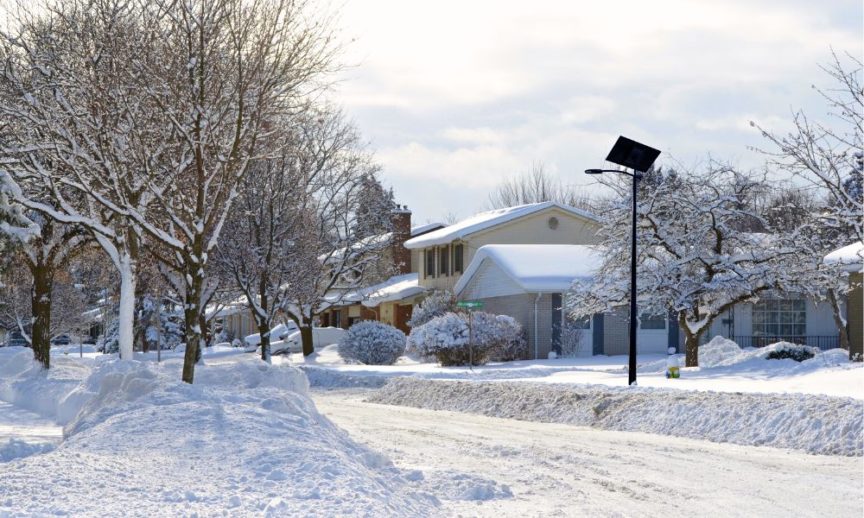Have you ever wondered how commercial solar lights work in the wintertime? Considering the shorter days and longer, cloudier nights, you may worry that your outdoor lighting won’t provide enough illumination for your property—but don’t fret! Solar-powered lights can deliver significant energy savings year-round without sacrificing visibility or security. In this blog post, we’ll discuss what makes these lights efficient during the winter and explain why they are an excellent investment even when there’s less daylight. Read on to learn more about harnessing the power of the sun during cold-weather months!
How Does Cold Weather Affect Solar Panels?
Cold weather has minimal effect on solar panel performance. In fact, when temperatures dip, solar lights can actually be more effective. As the temperature drops, photovoltaic cells become more efficient, meaning they absorb and convert light energy into electricity more efficiently. This means a commercial solar lighting system in cold weather can produce more power than the same system in warm conditions.
How Does Snow Affect Solar Panels?
Snow is common in most regions during the winter months. So how does it affect the efficiency of solar panels?
A light dusting of snow will have minimal effect on solar panels—light can still penetrate through the thin sheet, and the wind or sun will disperse the powder before long. That said, heavy snowfall can pose a risk for solar panels. Snow can accumulate on solar panels and put pressure on the panels, causing microcracks to form. It can also block the panels from absorbing sunlight and generating power. Fortunately, there’s an easy solution to this problem—adjusting the panel to a steeper angle allows snow to slough off the panel. The panels face south toward the warming sun. The black surface absorbs heat, and the snow cover quickly slides off the tempered glass surface.
Are Your Solar Lighting Batteries Formulated To Tolerate Below-Freezing Weather?
Older solar lighting systems used some form of lead-acid battery, such as AGM or Gel. These batteries have a good operating range but lose a lot of capacity in cold weather. That means you have less energy when you need it most. Many lithium-ion batteries operate well in cold temperatures, but charging them in freezing temperatures starts a plating process that deteriorates them. You’ll need to change the batteries more frequently. Fonroche offers industrial nickel-metal-hydride battery formulations that can operate in temperatures from -40°C (-40°F) to 70°C (158°F).
Is Your Solar Lighting System Optimized for Winter, or Is It One Size Fits All?
Whether you live in Southern California or northern Maine, the amount of solar capacity you’ll need in winter is greater than what you’ll need in summer. A big reason is that the days are shorter in winter, but you need to consider local weather patterns as well. That’s why it’s important to get a solar energy assessment for your project location.
How Do Commercial Solar Lighting Systems Work in Winter?
All-in-one and consumer products can be a disappointment, but commercial solar street lighting systems can provide the reliability necessary for public lighting. Your outdoor solar lighting system can continue to provide ample illumination and energy savings during even the coldest months of the year. Make sure to keep these tips in mind when preparing for wintertime, and your business can enjoy vibrant lighting, no matter the season!
Winter weather can be harsh, but with the right solar lighting system from Fonroche Lighting America, you don’t have to worry. Fonroche Lighting America is a commercial solar lighting company that offers state-of-the-art solar lights designed to operate in all weather conditions, including throughout the winter months. Get the most out of your solar lighting system—trust Fonroche Lighting America to light up your world! Explore our products today or feel free to contact us with any questions.

